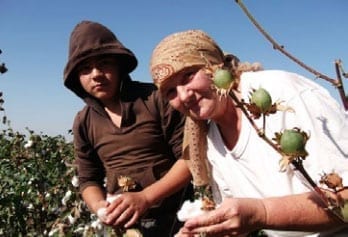Uzbek human rights defender Elena Urlaeva was released from a psychiatric hospital in Tashkent yesterday where she was imprisoned for 23 days with neither her consent nor a court order to forcibly treat her, according to the Cotton Campaign. Urlaeva’s release follows an international campaign spearheaded by the Cotton Campaign, a global coalition of labor, human rights, investor and business organizations that includes the Solidarity Center.
Urlaeva was detained and beaten by Uzbekistan police the day before she was due to meet with representatives from the International Labor Organization (ILO), International Trade Union Confederation (ITUC) and the World Bank to discuss state-led forced labor in Uzbekistan.
Urlaeva Repeatedly Detained for Documenting Forced Labor
Urlaeva has documented forced labor in Uzbekistan’s cotton fields for the past 16 years, and has repeatedly been arrested, beaten and imprisoned by Uzbek officials. Last year, she was imprisoned in a psychiatric hospital for more than a month and arrested five times as she spoke with people forced by the government to labor in the country’s cotton fields. She was physically assaulted during the subsequent interrogation. In 2015, Urlaeva was arrested, beaten and forced to injest sedatives, and police confiscated her camera, notebook and information sheet on ILO labor rights conventions.
“A number of times I was put into a psychiatry ward,” says Urlaeva in a video released last November. “They did their best to show to the international community that human rights activists are crazy and they should not be listened to.”
Child Labor Growing in Uzbekistan Cotton Fields
Each fall harvest, some 1 million teachers, medical professionals and others are forced to toil in Uzbekistan’s cotton fields. If they do not participate, they must pay for a replacement worker or lose their jobs. Children also are forced to pick cotton, according to a preliminarily report by the Uzbek-German Forum, reversing a move away from use of child labor in 2013 and 2014.
Uzbekistan, which gets an estimated $1 billion per year in revenue from cotton sales, faced high penalties from the World Bank and other financial institutions for not ending the practice. Rather than change, the government seeks to cover it up.
Urlaeva has been credited with helping significantly reduce child labor in cotton fields, and this year was among human rights defenders in Uzbekistan to receive the International Labor Rights Forum 2016 Labor Rights Defenders Award.

